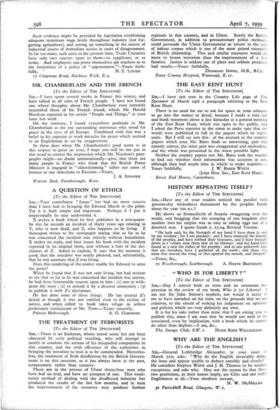A QUESTION OF ETHICS
[To the Editor of THE SPECTATOR]
Sta,—Your contributor " Janus " has had no more success than I have had in bringing Sir Edward Marsh to the point. Yet it is both simple and important. Perhaps if I put it impersonally he may understand it.
X writes a book which he first publishes in a newspaper. In this he records an incident of thirty years ago relating to Y, who is now dead, and Z, who happens to be living. Z thereupon writes to the newspaper stating that so far as he was concerned the incident was entirely without foundation. X makes no reply, and later issues his book with the incident repeated in its original form, and without a hint of the dis- claimer of Z. Asked to explain, X says that his memory is good, that the anecdote was neatly phrased, and, inferentially, that he was unaware that Z was living.
Does this rendering of the matter enable Sir Edward to seize the point?
When he found that Z was not only living, but had written to say that so far as he was concerned the incident was untrue, he had three honourable courses open to him: (t) one to with- draw the story ; (2) to amend it by a discreet anonymity ; (3) to publish it with Z's disclaimer.
He has done none of these things. He has treated Z's denial as though it was not entitled even to the civility of notice, and when called to book takes refuge in artless ,irrelevancy reminiscent of Mr. Toots.—Yours sincerely,










































 Previous page
Previous page